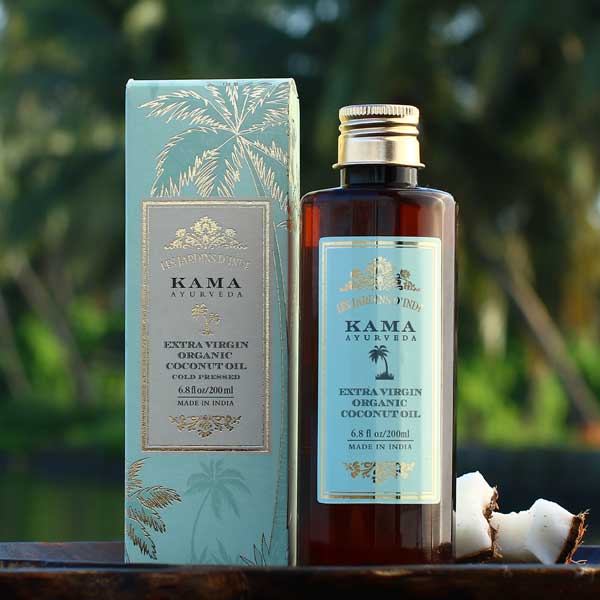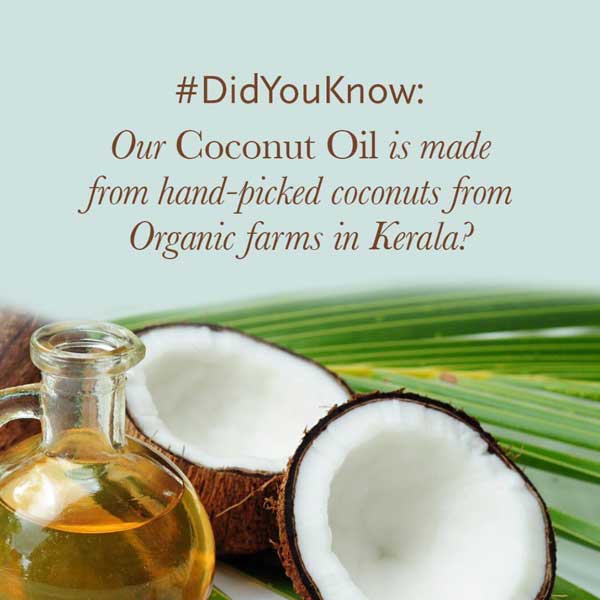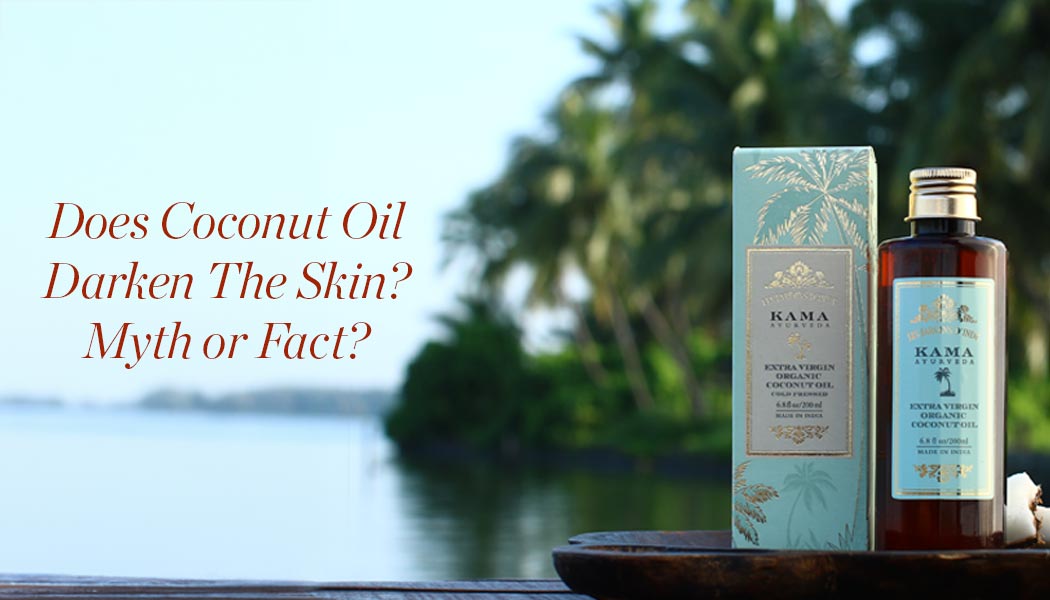Coconut oil, a staple in beauty and skincare regimens across the globe, is often touted for its numerous benefits, from moisturizing parched skin to giving lustrous shine to hair. However, one question that frequently arises is, "Does coconut oil darken the skin?"
There's no one-size-fits-all answer. While many of us cherish the natural remedies provided by coconut oil, it's essential to separate myth from reality.
Does Coconut Oil Darken the Skin?
You might have come across the myth suggesting that coconut oil can darken the skin. This myth, though widely circulated, is one of the most significant misconceptions. Using coconut oil can, in fact, reduce skin dryness, combat flakiness, and render the skin soft and supple.
Contrary to darkening, some users have reported that coconut oil has reduced the appearance of uneven skin tone and dark spots.
What Does Science Say?
To date, there's no solid scientific evidence to suggest that coconut oil inherently darkens the skin. Some preliminary studies have shown no significant darkening when coconut oil is applied as instructed. Over-application or leaving it on for extended periods might result in slight changes in skin tone, but this is not conclusive.

Read - Why Is Virgin Coconut Oil So Good For Your Hair and Skin?
Does Applying Coconut Oil Make Skin Dark?
Several theories might explain why some believe coconut oil darkens the skin:
- Natural Sunscreen: Coconut oil does offer minor sun protection, with an SPF ranging between 4-6. This low SPF might not be enough to prevent tanning, leading to perceived darkening.
- Lauric Acid Content: Rich in lauric acid, coconut oil can stimulate melanin production, the pigment responsible for skin color. In theory, this could lead to a deepening of skin tone, especially in those with darker complexions.
- Regional Observations: It's been observed that individuals from regions like South America and Southeast Asia may be more susceptible to skin tone changes due to oils. However, this is based on anecdotal evidence and not broad scientific consensus.
What experts say -
"For some individuals, the use of oils can attract more dirt or environmental pollutants when not washed off appropriately. This may give a temporary 'darkened' appearance to the skin, but it's superficial and not a direct pigmentary change induced by the oil itself." - Dr Aruna Purohit
Read - How To Use Coconut Oil For Face – 10 Beauty Hacks
Can Coconut Oil be Used As A SunScreen?
While coconut oil possesses some UV-blocking properties, it is not sufficient to be used as a standalone sunblock. The American Academy of Dermatology recommends using a sunscreen of SPF 30 or higher, as it effectively blocks about 97% of the sun's damaging rays.
In contrast, coconut oil only obstructs around 20% of these rays. Relying solely on coconut oil for sun protection is inadequate and could expose the skin to potential harm.
What Are The Benefits Of Coconut Oil For Skin?
Packed with nourishing properties, Coconut offers a plethora of benefits that cater to the needs of different skin types. Here are the top benefits of the oil that is boon for your skin:
1 Moisturizes and Shields the Skin:
Coconut oil, loaded with fatty acids, moisturizes the skin, combating dryness. Additionally, it forms a barrier against environmental pollutants, ensuring the skin stays soft and protected.
2 Softens and Diminishes Signs of Aging:
Coconut oil naturally softens the skin. With ongoing use, it improves skin texture and helps reduce the visibility of fine lines and wrinkles.
3 Balances Skin Tone and Reduces Blemishes:
Coconut oil can address uneven skin tones. A DIY scrub made from coconut oil, sugar, lemon, and coffee helps lighten dark spots. By moisturizing and targeting these patches, the oil promotes a consistent skin tone and radiant glow.
4 Calms and Repairs Skin:
For skin that's irritated or inflamed, coconut oil offers relief. Its anti-inflammatory properties soothe damaged skin, and the presence of vitamin E and antioxidants promotes healthier skin and a brighter complexion.
5 Fights Skin Infections:
Coconut oil is notable for its antibacterial and antifungal properties. Applied to the skin, it tackles underlying infections causing various skin issues, such as acne or sunburn. It's also useful for treating fungal infections on toenails.
6 Rich in Antioxidants and Essential Fatty Acids:
Coconut oil is also a powerhouse of antioxidants and essential fatty acids. These elements are instrumental in neutralizing free radicals, which can cause oxidative stress and premature aging.

What experts say -
"The unique molecular structure of coconut oil, rich in medium-chain fatty acids, facilitates a rapid absorption into the skin, providing immediate hydration and enhancing the skin's lipid barrier." - Dr Kanchan Kachroo
Side Effects Of Coconut Oil
Like any skincare product, it's essential to understand its potential side effects and whether it suits your specific skin type.
- Acne Breakouts: For those with oily or combination skin, Coconut oil might not be the best choice. It has a tendency to clog pores, which can exacerbate acne. In fact, dermatologists often advise individuals with acne-prone skin to be cautious when using coconut oil due to its potential to clog pores.
- Blackheads and Whiteheads: An overnight application of Coconut oil, especially on oily skin, might lead to an increase in blackheads, whiteheads, or pimples. While some believe in Coconut oil's prowess in clearing up blemishes, others find that prolonged contact can lead to these skin issues.
- Allergic Reactions: Although rare, certain individuals may be sensitive to components like lauric acid found in Coconut oil. If allergic reactions such as redness, itching, or swelling occur, it's essential to discontinue use immediately.
- Greasy Feeling: Coconut oil is a heavy, dense oil. For some, it might leave a greasy residue, making the skin feel oily.
- Dryness or Irritation: Paradoxically, while Coconut oil can moisturize, some users report increased dryness or skin irritation after prolonged use. This could be a result of the oil's occlusive nature, which might trap substances on the skin's surface, leading to irritation.
- Interference with Skincare Products: If used in conjunction with other skincare products, Coconut oil can sometimes interfere with their absorption or efficiency, due to its occlusive properties.
Which Is Best Coconut Oil For Skin?
The best coconut oil for skin depends on a few factors, including the intended use, your skin type, and personal preferences regarding production methods and purity. However, some general guidelines can help you choose a high-quality coconut oil for skin application:
- Virgin or Extra Virgin Coconut Oil: This refers to coconut oil that has been extracted from the fruit without the use of chemicals or high heat. It retains most of the beneficial properties of the coconut, making it a superior choice for skin.
- Cold-Pressed: Cold-pressed coconut oil is processed at temperatures that do not degrade its beneficial properties. This ensures that the oil retains its natural vitamins and antioxidants.
- Organic: Organic coconut oil is made from coconuts that are grown without the use of pesticides or other harmful chemicals. This is particularly important for a product you'll be applying directly to your skin.
- Unrefined: Unrefined coconut oil has not been bleached or deodorized, preserving its natural composition and benefits.
- Transparent Production: Brands that are transparent about their sourcing and production methods often provide a higher quality product. Some brands will offer information about where their coconuts are sourced, how the oil is extracted, and whether it is tested for purity.

What experts say -
"When selecting coconut oil for your skincare routine, always opt for the unrefined, virgin varieties. This ensures you're benefiting from its purest form, teeming with vital antioxidants and nutrients that our skin craves." - Dr Gopan G
What Is The Best Way To Use Coconut Oil On Skin?
If you have normal to dry skin, coconut oil can serve as a fantastic moisturizer, soothing irritations and hydrating parched skin. However, if your skin leans towards being oily or if you're prone to breakouts, it's advisable to limit the time coconut oil stays on your face.
For better results, apply it for a short duration to harness its moisturizing benefits and then rinse off with plain water. Always conduct a patch test before fully incorporating coconut oil into your skincare routine, especially if you're trying it for the first time or have known skin sensitivities.

Safety and Precautions
While Coconut oil is celebrated for its benefits, caution is always advised. Always conduct a patch test before full application, and use the oil moderately. Excessive application might lead to unwanted cosmetic changes, such as an oily complexion or potential shifts in skin tone.
For those wary of coconut oil's effects, there are many alternatives. Oils like Argan and jojoba offer hydration and environmental protection, minimizing risks associated with potential skin darkening.
